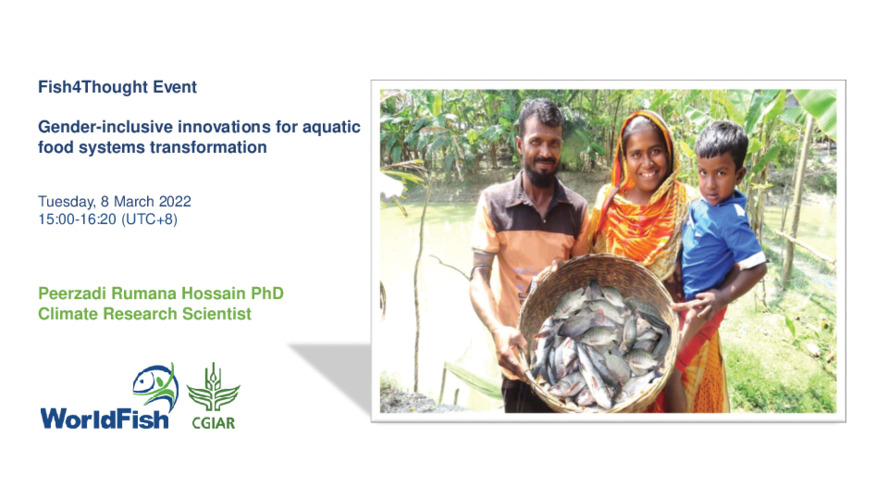Gender-inclusive innovations for aquatic food systems transformation

Bangladesh is a highly vulnerable country to climate change, variability and extremes. Seasonal signature of extreme heat, heavy and mean precipitation changes, floods and cyclones are few among the challenges. These are having impacts on aquaculture operations and creating risks for fish-farmers in this deltaic region. To reduce the climate-induced risks in day-to-day aquaculture operations, WorldFish jointly with partners, after having dialogues and consultation meetings with different value chain actors, has developed a digital decision support system for communicating site specific climate information services (CIS), which was initially supported by CGIAR research programme on CCAFS, followed by BMGF funded IDEA project. The key objective is to empower aquatic food producers by providing access to the high-quality and context specific CIS tailored to the climate risks of aquatic food systems. Primarily, we develop CIS with a five day lead time based on a decision framework targeting temperature and rainfall thresholds for climate sensitive management decisions in day to day aquaculture operations, particularly for south-western downstream coastal region and north-eastern upstream flood plains. Then we explore that developing a seasonal CIS with one month lead time can be useful to decide when to start pond preparation, a particular period for fingerling stocking, production volume, maintenance and harvesting schedule. Therefore, we start scaling this knowledge to the north-western drought-prone region of the country through IDEA project’s digital platform “The Right Fish” - Facebook farmers group. This group has around 9.7K active fish farmers of which 11% are women. Besides, we have disseminated CIS at regional level in the State of Odisha, India through Reliance Foundation Information Services platform to around 50,000 inland fish-farmers. Currently we have started working in Zambia to develop CIS in the context of that region as well. These chain of actions reveal scaling of our knowledge from national through regional to global scale, which will substantially support aquatic food producers to adapt and manage climate risks and, thus, offset climate impacts. To make these digital solutions self-sustainable and to reach at a very large scale, we have started developing networks with the active participation of private entrepreneurs and large private companies. In addition, considering women’s engagement in supplementary in-house fish-farming activities, which resulted not only restricted involvement in day to day aquaculture operations but also restricted decision-making roles so far, we identify this digital approach of providing CIS as gender inclusive innovation in the light of climate risks to manage. So if risk reduction information and services using such innovative approach can be provided to our women actors and simultaneously, if their access to such decision support systems can be ensured, CIS will substantially promote women and youth’s involvement in regular management decisions, strengthen their voice in decision making role and develop their climate resilience capacity as well. Hence, enhancing climate-smart and gender-inclusive digital innovations is critical for equitable aquatic food systems transformation at scale.
Permalink
Date Available
Type
Publisher
Countries
Copyright
CC-BY-NC-4.0
Research Themes
Topics
Language